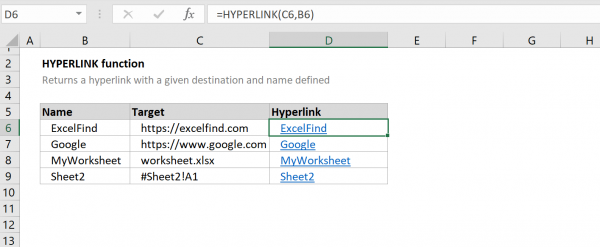5 Ways to Easily Create Hyperlinks Between Sheets in Excel

Excel is an incredibly powerful tool for organizing, analyzing, and presenting data. One of its most useful features is the ability to create hyperlinks between different sheets within the same workbook. This functionality allows users to navigate complex spreadsheets more efficiently, jump from one dataset to another with a single click, and present their work in a much more interactive way. Let's delve into five straightforward methods to create hyperlinks between sheets in Excel and enhance your Excel navigation.
Using the HYPERLINK Function

The simplest way to add hyperlinks within Excel is by using the HYPERLINK function. Here’s how you can do it:
- Step 1: Click on the cell where you want to insert the hyperlink.
- Step 2: Enter the formula:
=HYPERLINK(“#SheetName!A1”, “Link Text”)where “SheetName” is the name of the sheet you want to link to, and “A1” is the specific cell reference. “Link Text” is the text that will be displayed.
🔗 Note: When linking to a different workbook, ensure the workbook is already open. Use the full path if it's a closed workbook.
Using the ‘Insert Hyperlink’ Feature

If you prefer a more visual approach, Excel offers the ‘Insert Hyperlink’ feature:
- Step 1: Right-click on the cell or text where you want to add the hyperlink.
- Step 2: Select “Hyperlink” from the context menu.
- Step 3: In the dialog box, click on “Place in This Document,” choose the sheet and optionally a specific cell or named range.
- Step 4: Set the display text for the hyperlink and click OK.
Creating Hyperlinks Using VBA

For those comfortable with coding, Visual Basic for Applications (VBA) can offer a more dynamic approach to hyperlink creation:
- Step 1: Open the Visual Basic Editor (Alt+F11).
- Step 2: Insert a new module and write or paste the following code:
Sub AddHyperlink()
With Sheets(“Sheet1”).Range(“A1”)
.Formula = “=HYPERLINK(”“#Sheet2!A1”“,”“Go to Sheet2”“)”
End With
End Sub💡 Note: This VBA method allows for automation and can be adapted to more complex hyperlinking scenarios.
Drag and Drop Hyperlinking

Excel also supports a drag-and-drop method for creating hyperlinks:
- Step 1: Press and hold the Ctrl key, then drag and drop a cell or range from one sheet to another.
- Step 2: Release the mouse button, and a hyperlink will be created linking to the original source location.
🔍 Note: This method is less customizable but quick for simple linking needs.
Named Ranges for Hyperlinking

Using named ranges can make hyperlinking more intuitive and easier to manage:
- Step 1: Select the range or cell you want to link to and give it a name using the Name Box or Define Name feature.
- Step 2: Use this name in your HYPERLINK function or ‘Insert Hyperlink’ dialog for an easier reference.
Creating a Hyperlink Menu

Lastly, if you deal with a workbook with numerous sheets, creating a hyperlink menu can be beneficial:
| Sheet Name | Link Formula |
|---|---|
| Home | =HYPERLINK(“#Home!A1”, “Home”) |
| Inventory | =HYPERLINK(“#Inventory!A1”, “Inventory”) |
| Sales | =HYPERLINK(“#Sales!A1”, “Sales”) |

Integrating hyperlinks into your Excel workbooks not only improves navigation but also boosts productivity by allowing users to jump between different datasets effortlessly. Whether you use the HYPERLINK function for simplicity or VBA for automation, each method has its benefits. In practice, combining several of these techniques can result in a workbook that is both functional and user-friendly.
Remember, the key to mastering Excel is understanding its various features and using them in a way that enhances your workflow. By incorporating these hyperlinking techniques, you're not only organizing data more efficiently but also creating a seamless experience for anyone interacting with your spreadsheets.
Can I link to a cell in another workbook?

+
Yes, you can link to another workbook by using the full file path in the HYPERLINK function or the ‘Insert Hyperlink’ dialog. Make sure the other workbook is already open or use a fully qualified path for closed workbooks.
How do I update hyperlinks if I change the sheet name or cell reference?

+
Manually update each hyperlink to reflect the new sheet name or cell reference. Alternatively, use named ranges as they can be updated and the hyperlink will still work.
What happens if I delete the destination of a hyperlink?

+
If the destination (sheet or cell) is deleted, clicking the hyperlink will result in an error. You’ll need to update or remove such broken links.
Can I create hyperlinks to external websites or email addresses?

+
Yes, using the HYPERLINK function or ‘Insert Hyperlink’ feature, you can link to websites by entering the full URL or email addresses by using the “mailto:” prefix.
Is there a way to create a hyperlink that updates automatically?

+
Excel does not support hyperlinks that automatically update. However, using named ranges or VBA can help manage hyperlinks dynamically when data changes.



